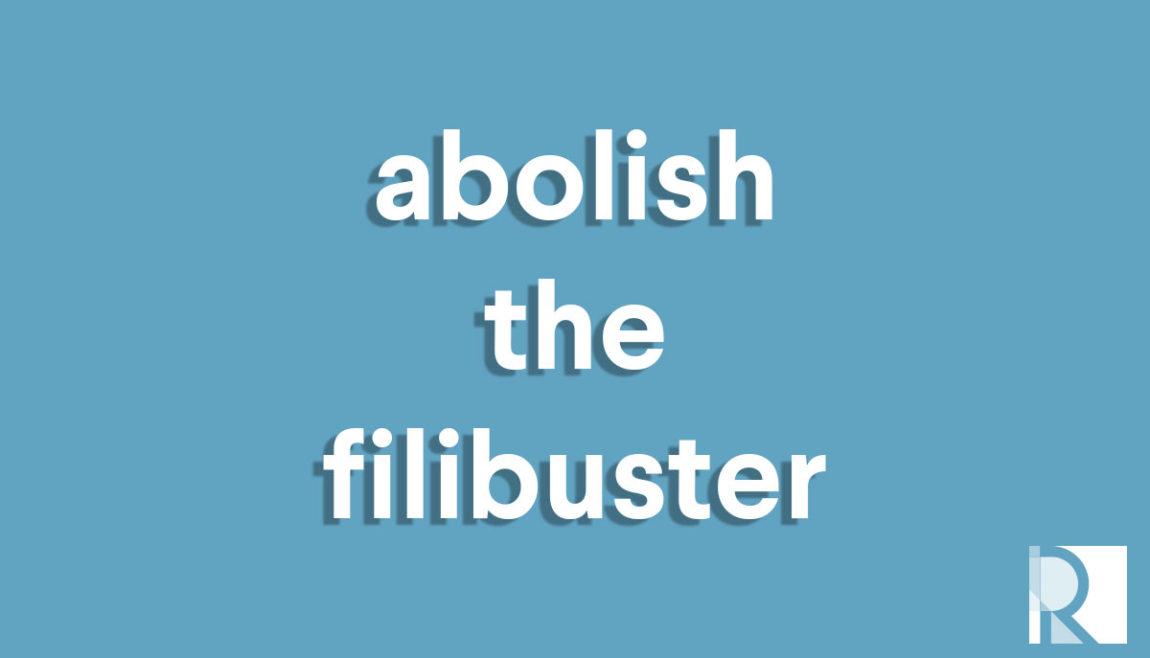Then and Now: The Filibuster Obstructs Policies for the People
July 2, 2021
By Emily DiVito

Defenders of the filibuster romanticize it as a prerequisite for bipartisanship and a foundational feature of the Senate. But in reality, it’s a procedural tool that was created in the 19th century and has since obstructed legislation that would promote and protect racial and economic equality.
Just last week, the For the People Act, a bill that would have dramatically enhanced voting rights and access, failed to overcome a Republican filibuster, making it just one in a long list of progressive reforms that would likely have become law if not for the filibuster.
The filibuster’s very creation disproves one of its supporters’ main arguments—that it is part of the founders’ original vision for the Senate. The filibuster is a mistake, a loophole created in the early 19th century whereby senators could hold the floor and refuse to end debate on a bill to delay a vote indefinitely.
As a consequence of its accidental origin, the Senate has few rules for filibustering. For much of the Senate’s history, none were needed, as norms prevented abuse. Only in 1917, after a small group of senators effectively blocked a military arms bill, did the Senate create the cloture rule to end a filibuster and force a vote on a bill. Today, the threshold to reach cloture is three-fifths of the Senate, or 60 votes. Thus, the filibuster creates the paradoxical situation whereby a bill needs only a simple majority for final passage, but 60 votes to overcome a filibuster.
Not coincidentally, use of the filibuster escalated dramatically at the same time prominent early civil rights legislation started making its way through Congress. Conservatives and Southern Democrats wielded the filibuster to prevent anti-lynching, anti-discrimination, and voting rights legislation for much of the early and middle 20th century.
But ever since would-be obstructionist senators learned of the filibuster’s potency, they’ve deployed it with abandon—thwarting progressive reforms that would have helped rebalance worker and corporate power in the economy.
Since 1947, the Senate has held more than 1,749 votes to invoke cloture (compared to only 19 total such votes between 1917 and 1947), and 1,216 of those votes have occurred over the last 20 years alone.
In a brief for the Roosevelt Institute, I examined every failed cloture vote in the Senate since 1947 (that is, an imperfect proxy for every failed attempt to override a filibuster) and identified eight bills that would have either enhanced worker power or reined in corporate influence and—importantly—likely would have been enacted if not for the filibuster. In other words, over the last several decades, eight pieces of potentially powerful legislation that would have benefited workers or checked corporate misconduct failed solely because of the filibuster.
These bills include:
- Right-to-Work Repeal: In 1966, the House passed and President Lyndon Johnson supported a repeal of Section 14(b) of the 1947 Taft-Hartley Act that allows states to pass so-called “right-to-work” laws that ban union shops. With the bill’s failure, section 14(b) has remained on the books for more than 70 years and has permitted 27 states to pass laws undermining labor unions.
- Campaign Finance Reform: The filibuster bested several attempts at campaign finance reform, including a 1999 precursor to McCain-Feingold and the 2010 DISCLOSE Act. Each would have established new and stricter campaign finance limits and disclosure requirements for political spending.
- A Stronger Dodd-Frank: An early iteration of the Restoring American Financial Stability Act of 2010, known as Dodd-Frank, included a much stronger Volcker Rule to prevent banks from engaging in proprietary trading, more independence for the new consumer bureau, and a fund to make big banks pay for any future bailouts. Negotiations to secure enough votes to invoke cloture necessitated concessions that weakened the bill.
- Paycheck Fairness: In 2010, the Paycheck Fairness Act, which would have updated the Equal Pay Act of 1966 to make it easier for women to raise pay discrimination claims against their employers, had passed the House and had the support of President Barack Obama, but failed to overcome a filibuster. A version of this bill has been introduced in every Congress since, and, at the time of writing, is once again being filibustered in the Senate.
As certain senators hide behind a revisionist analysis of the filibuster as necessary to amiable lawmaking, they’re failing to take action on critical issues. President Biden’s American Jobs Plan and American Families Plan are in jeopardy of being watered down or hacked up to qualify for budget reconciliation, a legislative process that avoids a filibuster but restricts a bill’s content. And at risk are:
- The John Lewis Voting Rights Act to reinstate Section 5 of the Voting Rights Act of 1965, which required states with a history of voting discrimination to pre-clear voting rule changes with the federal government;
- The Protecting the Right to Organize (PRO) Act to protect and expand workers’ rights to join a union and collectively bargain; and
- Every piece of legislation—from climate action to comprehensive immigration reform —that won’t be aggressively pursued or even introduced because lawmakers know it could never beat a filibuster.
At the critical moment we’re in—having made significant progress combatting COVID-19 and on the brink of an economic boom—we can’t let an accidental loophole dictate what is politically possible. The filibuster has frequently presaged the defeat of progressive civil rights, worker power, and economic reforms. That won’t change until we change it.
